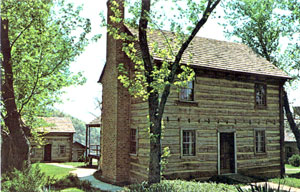
Rocky Mount
Rocky Mount, the home of William Cobb, served as the first capitol of the Southwest Territory. William Blount, the governor of the Territory of the United States South of the River Ohio, presided over the newly formed territory from 1790-92. On October 20, 1790, Blount wrote: “At William Cobb’s Washington County. . . . On the 11th instant, I arrived in this country, and was received with every mark of attention and gladness that I could have wished. I am very well accommodated with a Room with Glass Windows, Fireplace, etc., etc., at this place.” Other notable pioneers such as Daniel Boone, John Sevier, Daniel Smith, William Campbell, and Richard Henderson enjoyed Cobb’s hospitality as well. Andrew Jackson lodged at Rocky Mount for six weeks while waiting for his license to practice law in nearby Jonesborough.
Migrating from North Carolina in 1769, Cobb was one of the first settlers and most distinguished citizens of the territory. In 1777 the North Carolina legislature appointed Cobb as one of the first county magistrates. He also served on the commission charged with laying out the town of Jonesborough.
The house at Rocky Mount, erected ca. 1770, befits the distinguished family who built it. The multiple-room, two-story log house was large by frontier standards though not overly ornate. The glass windows that impressed Blount were indeed status symbols, but the pine mantels and paneled stairway suggested hospitality rather than high style.
Almost two centuries after it was built, Rocky Mount was bought from Cobb family descendants by the State of Tennessee in 1959. Three years later, on April 1, 1962, the Rocky Mount Historical Association opened the site to the public. Today, Rocky Mount Museum continues to receive guests with “every mark of attention and gladness.” At the living-history museum that interprets life in 1791, visitors may be greeted by “Mrs. Cobb” and given a tour of the house and grounds by various “friends” and “family members.” Guests are ushered into the kitchen where “servants” are hard at work preparing meals over an open hearth. Activities outside the Cobb home are equally in keeping with the period. Herbs and vegetables are grown in the yard and garden, while wool and flax are processed in the weaving cabin. A blacksmith shop, complete with forge, is located by the barn, and visitors can see wood shaped on the spring pole lathe in the wood shop. In the kitchen shed, dyeing cloth and washing clothes may be observed as a part of the day’s work.
Also on the property is the Massengill Museum of Overmountain History, which features period rooms with pottery, homemade tools, clothes, and a wagon that area pioneers used two centuries ago. Sheep shearing and herding are featured events during the annual Woolly Day. During the summer, families are invited to become members of an eighteenth-century wedding party.



